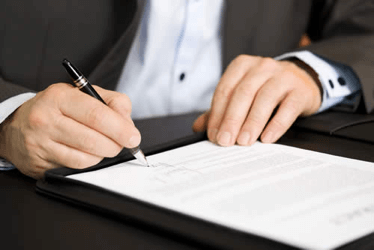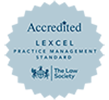
What Is a CCJ & How Does a CCJ Work?
If you’re currently exploring ways to recover money owed to your business, then you may have encountered the term CCJ. If you’re wondering what a CCJ is, and whether one can be used to recover money that is owed to you, keep reading and the Thomas Higgins team will tell you what you need to know…
What is a CCJ?
CCJs, also known as County Court judgments, are judgments which are handed down by a County Court located in England or Wales.
CCJs can be made against either an individual or a company and are typically used as a means of recouping an outstanding debt e.g. where an individual or company (the debtor) owes money to a company or other individual (the creditor).
When a CCJ is made - and concerns a monetary sum - the CCJ will be registered on the statutory Register of Judgments, Orders and Fines. This Register is operated by Registry Trust Ltd on behalf of the Ministry of Justice.
When a CCJ is added to the Register of Judgments, Orders and Fines, it becomes publicly available.
This means that individuals who have a CCJ successfully issued against them may find it difficult to obtain credit. A CCJ can also affect an individual’s credit score, further hampering their efforts to borrow money or secure loans or mortgages in the future.
CCJs remain on the Register of Judgments, Orders and Fines for six years (unless they are paid by the debtor within the first month of their issue).
In summary, CCJs are a common and effective way of recovering debt.
Note - in Scotland, a CCJ is called a ‘decree’
How to obtain a CCJ
If you’re a business that is currently owed a monetary sum by a debtor, you may be wondering if issuing a CCJ will be the best way of recovering what is owed.
Below, we’ve set out what the CCJ process looks like for recovering debts from individuals and businesses alike.
How to obtain a CCJ against an individual
If you’re attempting to recover a debt from an individual, then there are a few steps you must take first before applying for a CCJ against them.
For example, where an individual owes money, the creditor must first initiate what is known as a ‘pre-action protocol’. This involves sending the debtor a letter of claim (also known as a pre-action protocol letter) and providing them with 30 days to respond or arrange payment or a payment plan. As debt collection and recovery specialists, Thomas Higgins Limited will send the appropriate letter for you.
If after 30 days the debtor has not responded, the creditor will move to the next stage of the debt recovery process - taking court action against the debtor.
The process against an individual will generally follow these steps:
- A business concludes that a debtor is unwilling and/or unlikely to pay an outstanding debt that the business is owed. This is confirmed following the non-response from the debtor.
- The business then initiates a legal claim with the local County Court. As debt collection and recovery specialists Thomas Higgins Limited issues bulk claims and uses the Civil National Business Centre and our claim instructions are electronically sent for issue the following day.
- The County Court Claim form is then served on the debtor requiring them to pay the debt, plus interest and costs within 14 days from the date of service.
- The Court form will be sent to the debtor by post. The form will explain to the debtor:
- How much they owe.
- How they can pay.
- The deadline by which they must pay.
- Who to pay.
- If the debtor does not pay the debt within this specified time frame, the debtor is said to be in default and Creditor may apply for a CCJ.
- A CCJ allows the creditor to proceed to enforcement action.
How to obtain a CCJ against a business
The process of obtaining a CCJ against a business is very similar to the process of obtaining a CCJ to an individual.
The main difference is the action the creditor is required to take prior to applying for a CCJ.
In the case of recovering a debt from another business, a business should first exhaust all standard options for recovering the money; ie. issuing invoices, reminder letters, telephone calls etc.
Should that not work, the next step is to either:
- Issue a letter before action (LBA) - this sets out the amount owed, and a statement that legal action will be taken should the debt not be paid.
Or:
- Issue a late payment demand (LPD) letter - this sets out the amount owed, and a claim for compensation (under the Late Payment of Commercial Debts Regulations).
As debt collection and recovery specialists, Thomas Higgins can issue the appropriate letters for you. If either of these letters results in non-payment, then the next step involves initiating legal actions against the debtor business through the County Court. The process then follows the same path as obtaining a CCJ against an individual.
It’s important to note that in this instance the CCJ is issued directly against the company, not the company director(s).
How to enforce a CCJ
Unfortunately, successfully obtaining a CCJ against an individual or business doesn’t guarantee payment of an outstanding debt.
What if a debtor simply doesn’t pay? Then there are a number of enforcement actions you can take to recoup the money you are owed.
Understanding the individual’s/company’s financial situation
The first step in pursuing enforcement action should be researching the debtor’s financial situation.
Do they have the financial means to repay the debt?
There are a number of ways that a creditor can go about answering this question:
- If the debtor is a company, then much useful information can be obtained via Companies House (such as annual accounts, charges against business assets etc).
- For individuals, a credit search will often reveal a clearer picture of their financial situation.
- Using publicly available information e.g. Land Registry registers of title, to identify assets.
Having established - as far as possible - the current financial circumstances of the debtor, the creditor can then proceed to the most appropriate form of enforcement.
In the next section, we’ll cover the various enforcement options that are available to creditors who have secured a CCJ against a debtor.
Note - To begin enforcement, you must first pay a Court fee. This fee is set on a sliding scale and is based upon the value of your claim.
Bailiffs & High Court Enforcement Officers
Arguably the most ‘high profile’ form of debt collection, bailiffs can be instructed by the Court to collect the money from the debtor.
You can ask a County Court to instruct bailiffs by asking for a ‘Warrant of Control’.
A Warrant of Control gives Bailiffs permission to remove and sell goods belonging to the debtor to seek recovery of the debt. Thomas Higgins Limited instructs bailiffs where the Judgment debt, cost and interest is less than £600.00. Where a CCJ is above this figure, Thomas Higgins Limited instructs a High Court Enforcement Officer.
Can debtors avoid a CCJ & Enforcement?
Yes, there are a number of circumstances where debtors can avoid - or at least delay - enforcement.
For example, if bankruptcy proceedings have begun; it is generally not possible to issue a CCJ or take enforcement action (unless the debt is secured, or you have the permission of the Court to proceed with enforcement).
In some instances, a debtor can be placed in ‘breathing space’. Also known as the Debt Respite Scheme, this allows the debtor the right to legal protections from their creditors. However, this scheme relates only to individuals, not companies.
There are two types of breathing space open to debtors:
- Standard breathing space - this provides the debtor with protection from creditor action for up to 60 days. These protections include freezing most enforcement action and contact from creditors.
- Mental health crisis breathing space - this is only available to debtors who are receiving mental health crisis treatment.
Thomas Higgins Limited: the UK’s leading business debt collection and recovery Solicitors
At Thomas Higgins Limited we put you in control of your corporate debt recovery. At every stage you will make the decision to proceed, ensuring you’re not throwing good money after bad as you know your clients better than we do.
We also make it easy to manage and monitor your cases and have up-to-the-minute information on our Website, Apple or Android app.
Thomas Higgins Limited also offers a free, secure online service where you can issue instructions, view the status of your debt recovery and see any updates to your cases.
If you have any questions about our debt recovery services, contact us now.




